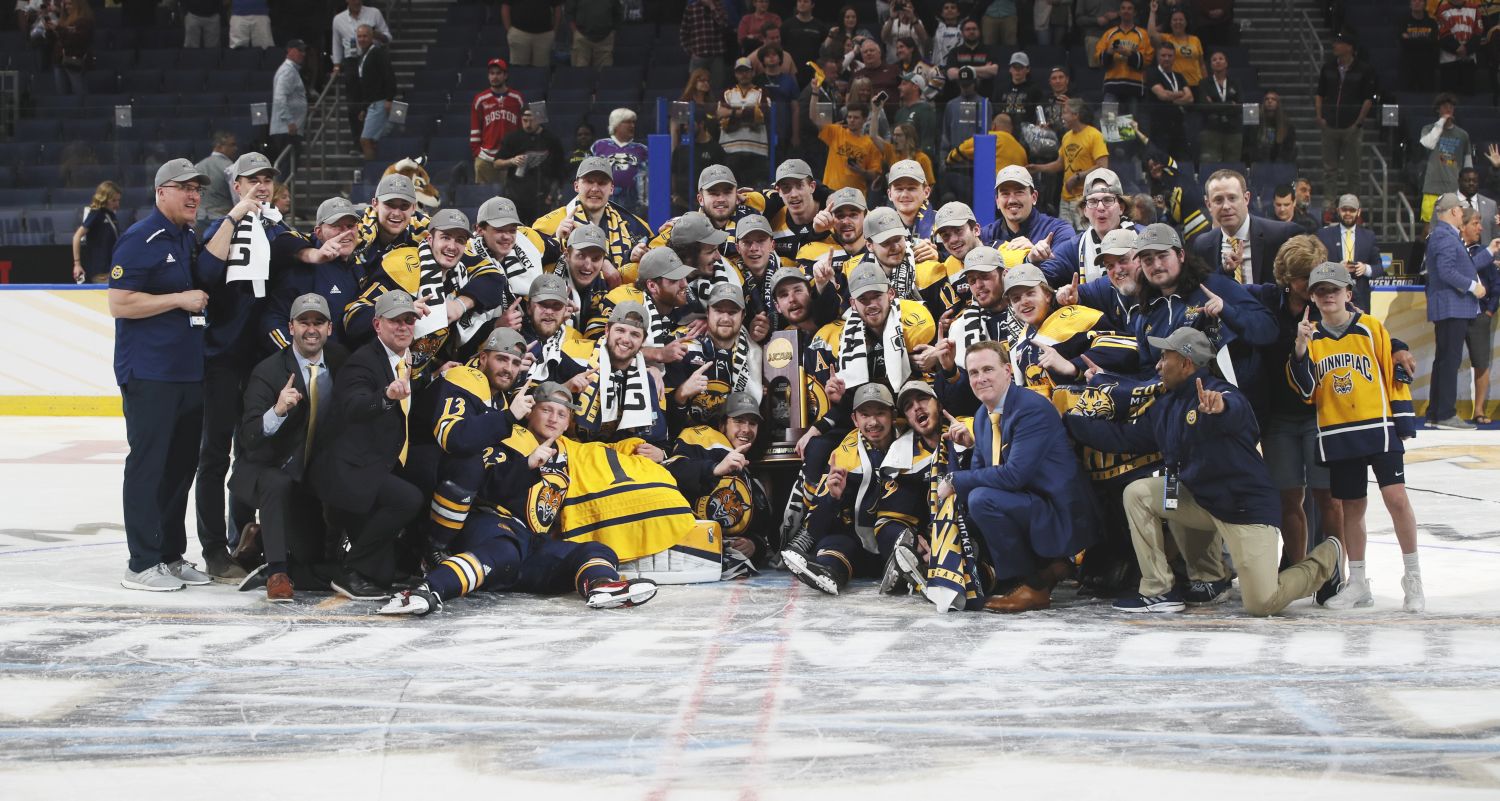
TAMPA, Fla. — Quinnipiac waited nearly 50 years to watch its program win a national championship, so waiting an extra 10 seconds was nothing.
After rallying from 2-0 down and scoring an extra-attacker goal late in the third period to force overtime, Quinnipiac needed just 10 seconds in the extra session.
Forward Jacob Quillan took a perfect feed from Sam Lipkin, went in alone on Minnesota goaltender Justen Close and buried the puck around the netminder to give the Bobcats a 3-2 victory and the program’s first national championship on Saturday at Amalie Arena.
It was the fastest overtime game winner in NCAA championship game history, besting Wisconsin’s winner that came 23 seconds into overtime in 1977.
The goal came on a set play off the center-ice draw, with Quillan winning the puck back to Zach Metsa. Metsa hit Lipkin in stride with Quillan streaking to the net.
“It’s a neutral-zone faceoff play,” Metsa said of the goal. “You just attack the middle and [Lipkin] made an unbelievable pass back to [Quillan], crazy finish. I had a great view of it. It was awesome to watch.”
The victory gave Quinnipiac its first national championship for a program that has played at the Division I level since only 1999. It also avenged two losses in the finals in 2013 to Yale and 2016 to North Dakota, the latter coming in the same building.
Minnesota held a 2-1 lead heading to the third period but the final frame was dominated by Quinnipiac, which outshot Minnesota 14-2.
A penalty with 4:52 remaining to Minnesota’s Logan Cooley for high sticking sent Quinnipiac to its second power play of the game. With 36 seconds remaining on the power play, Quinnipiac coach Rand Pecknold called his timeout and pulled goalie Yaniv Perets for the extra attacker.
Seconds after the penalty expired, Collin Graf’s shot seemed to confuse Close, beating him five-hole to even the score at 2-2 and force overtime.
“[Collin] Graf makes a great play,” said Pecknold. “If you watch that goal we score that goal because Sam Lipkin is doing exactly what he’s told to do. He’s hiding off the back post. And the goalie knows that. And he cheats the pass and Graf beats him with the fiver.”
The game began with a frenzy. It took just 21 seconds for Quinnipiac, the nation’s least penalized team, to find itself short-handed after Skyler Brind’Amour laid a hard hit on Minnesota’s Mike Koster. The hit was reviewed for a potential major before it was determined the hit was indirect contact to the head, resulting in just a minor penalty.
Minnesota couldn’t capitalize but got some early momentum off the power play and minutes later scored.
Connor Kurth picked off an errant pass from Jayden Lee, skated around the net to pull Perets out of position. Kurth centered the puck to John Mittelstadt, who buried it into the gaping net at 5:35.
In the second, Minnesota extended its lead off a set play of its own on an offensive-zone draw. Center Jaxon Nelson won the draw back to Brock Faber and immediately headed to the net. Faber intentionally shot the puck wide on Perets’ glove side, and when the puck ricocheted off the kick plate, Nelson was ready to fire it into the empty net at 4:24.
Quinnipiac was desperate for a response and, less than four minutes later, got one. Metsa picked off a puck at the offensive blue line, skated down low and centered a perfect pass through the goal mouth to Cristophe Tellier, who made the perfect redirect inside the left post at 7:41.
The Bobcats controlled the period, holding an 11-6 advantage in shots, but still trailed 2-1 entering the third.
For Minnesota and coach Bob Motzko, the loss was a difficult one to swallow, knowing that his team was in position.
“Tip your hat to Quinnipiac. They’re very difficult. But we were in the right spot,” Motzko said. “Turned the puck over for one. Second one never should have gone in. That was the unfortunate situation right there.
“We had a chance. I’m crushed. We just have a wonderful group. The love in that room for that group, I’m just crushed for them and for all of us.”
For Pecknold and his Quinnipiac team, the victory is a culmination for a program that grew from almost nothing. When he took over the club, Quinnipiac was playing a Division III schedule. But Pecknold oversaw the transition to Division I, a move to the MAAC and then Atlantic Hockey, the construction of a high-end arena and a move to ECAC Hockey.
Now he’s a national champion.
“Some of the guys were here tonight from that first team,” Pecknold said. “It’s incredible to do what we’ve done and be where we are. Just excited to get it done.”


